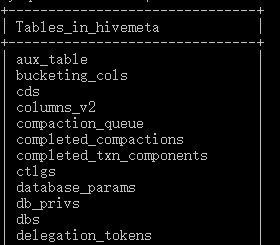Interconnecting Hive with External Self-Built Relational Databases¶
Note
This section describes how to connect Hive with built-in relational databases open-source MySQL and Postgres.
After an external metadata database is deployed in a cluster with Hive data, the original metadata tables will not be automatically synchronized. Before installing Hive, determine whether to store metadata in an external database or DBService. For the former, deploy an external database when installing Hive or when there is no Hive data. After Hive installation, the metadata storage location cannot be changed. Otherwise, the original metadata will be lost.
Hive supports access to open source MySQL and Postgres metabases.
Install the open source MySQL or Postgres database.
Note
The node where the database is installed must be in the same network segment as the cluster, so that they can access each other.
Upload the driver package.
PostgreSQL:
Use the open source driver package to replace the cluster's existing one. Download the open source PostgreSQL driver package postgresql-42.2.5.jar at https://repo1.maven.org/maven2/org/postgresql/postgresql/42.2.5/ and upload it to the ${BIGDATA_HOME}/third_lib/Hive directory on all MetaStore nodes.
Run the following commands on all MetaStore nodes to modify the permission on the driver package:
cd ${BIGDATA_HOME}/third_lib/Hive
chown omm:wheel postgresql-42.2.5.jar
chmod 600 postgresql-42.2.5.jar
MySQL:
Visit the MySQL official website at https://www.mysql.com/, choose DOWNLOADS > MySQL Community(GPL) DownLoads > Connector/J, and download the driver package of the required version.
Versions earlier than MRS 8.2.0, upload the driver package to the /opt/Bigdata/FusionInsight_HD_*/install/FusionInsight-Hive-*/hive-*/lib/ directory on all RDSMetastore nodes.
MRS 8.2.0 and later versions, upload the driver package to the ${BIGDATA_HOME}/third_lib/Hive directory on all RDSMetastore nodes.
Run the following commands on all MetaStore nodes to modify the permission on the driver package:
cd /opt/Bigdata/FusionInsight_HD_*/install/FusionInsight-Hive-*/hive-*/lib/
chown omm:wheel mysql-connector-java-*.jar
chmod 600 mysql-connector-java-*.jar
Create a user and metadata database in the self-built database and assign all permissions on the database to the user. For example:
Run the following commands in the PostgreSQL database to create the database hivemeta and the user testuser, and assign all permissions on hivemeta to testuser:
create user testuser with password 'password';
create database hivemeta owner testuser;
grant all privileges on database hivemeta to testuser;
Run the following commands in the MySQL database to create the database hivemeta and the user testuser, and assign all permissions on hivemeta to testuser:
create database hivemeta;
create user 'testuser'@'%' identified by 'password';
grant all privileges on hivemeta.* to 'testuser';
flush privileges;
Import the SQL statements for creating metadata tables.
SQL script path in the PostgreSQL database: ${BIGDATA_HOME}/FusionInsight_HD_*/install/FusionInsight-Hive-*/hive-*/scripts/metastore/upgrade/postgres/hive-schema-3.1.0.postgres.sql
Run the following command to import the SQL file to Postgres:
./bin/psql -U username -d databasename -f hive-schema-3.1.0.postgres.sql
Specifically:
./bin/psql is in the Postgres installation directory.
username indicates the username for logging in to Postgres.
databasename indicates the database name.
SQL script path in the MySQL database: ${BIGDATA_HOME}/FusionInsight_HD_*/install/FusionInsight-Hive-*/hive-*/scripts/metastore/upgrade/mysql/hive-schema-3.1.0.mysql.sql
Run the following command to import the SQL file to the MySQL database:
./bin/mysql -u username -p password -D databasename<hive-schema-3.1.0.mysql.sql
Specifically:
./bin/mysql is in the MySQL installation directory.
username indicates the user name for logging in to MySQL.
databasename indicates the database name.
To connect Hive to the open source database, log in to FusionInsight Manager. Choose Cluster > Name of the desired cluster > Services > Hive. Click Configurations then All Configurations, click Hive(Service), select MetaDB, modify the following parameters, and click Save:
Table 1 Parameters¶ Parameter
Default Value
Description
javax.jdo.option.ConnectionDriverName
org.postgresql.Driver
Driver class for connecting metadata on MetaStore
If an external MySQL database is used, the value is:
com.mysql.jdbc.Driver
If an external Postgres database is used, the value is:
org.postgresql.Driver
javax.jdo.option.ConnectionURL
jdbc:postgresql://%{DBSERVICE_FLOAT_IP}%{DBServer}:%{DBSERVICE_CPORT}/hivemeta?socketTimeout=60
URL of the JDBC link of the MetaStore metadata
If an external MySQL database is used, the value is:
jdbc:mysql://IP address of the MySQL database:Port number of the MySQL database/hivemeta?characterEncoding=utf-8
If an external Postgres database is used, the value is:
jdbc:postgresql://IP address of the PostgreSQL database:Port number of the PostgreSQL database/hivemeta
javax.jdo.option.ConnectionUserName
hive${SERVICE_INDEX}${SERVICE_INDEX}
Username for connecting to the metadata database on Metastore
Change the Postgres database password in MetaStore. Choose Cluster > Name of the desired cluster > Services > Hive > Configurations > All Configurations > MetaStore(Role) > MetaDB, modify the following parameters, and click Save.
Table 2 Parameter¶ Parameter
Default Value
Description
javax.jdo.option.extend.ConnectionPassword
******
User password for connecting to the external metadata database on Metastore. The password is encrypted in the background.
Log in to each MetaStore background node and check whether the local directory /opt/Bigdata/tmp exists.
If yes, go to 8.
If no, run the following commands to create one:
mkdir -p /opt/Bigdata/tmp
chmod 755 /opt/Bigdata/tmp
Save the configuration. Choose Dashboard > More > Restart Service, and enter the password to restart the Hive service.
Log in to the MySQL or PostgreSQL database and view metadata tables generated in the metadata database created in 3.

Check whether the metadata database is successfully deployed.
Log in to the node where the Hive client is installed as the client installation user.
cd Client installation directory
source bigdata_env
kinit Component service user (Skip this step for clusters with Kerberos authentication disabled.)
Run the following command to log in to the Hive client CLI:
beeline
Run the following command to create the test table:
create table test(id int,str1 string,str2 string);
Run the following command in the hivemeta database of the MySQL or PostgreSQL database to check whether there is any information about the test table:
select * from TBLS;
If information about the test table is displayed, the external database is successfully deployed. For example:
The result in the MySQL database is as follows:

The result in the PostgreSQL database is as follows:
